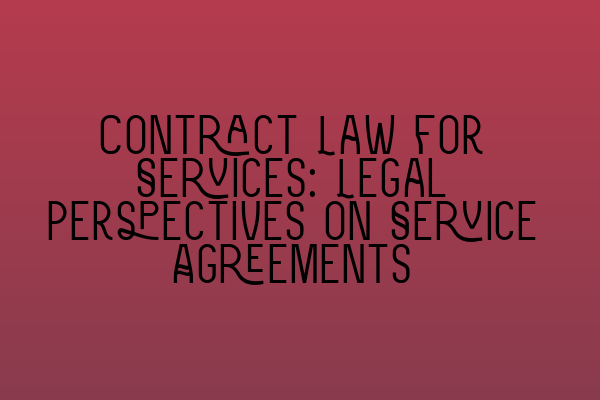Contract Law for Services: Legal Perspectives on Service Agreements
As a solicitor specializing in contract law, I have encountered numerous cases where service agreements have played a pivotal role in protecting the interests of both parties involved. Whether you are a service provider or a client seeking services, it is crucial to understand the legalities surrounding service agreements to ensure a smooth and enforceable arrangement.
In this blog post, we will delve into the intricacies of contract law for services, exploring key legal perspectives that can help you navigate the complexities of service agreements. We will discuss essential elements of a service agreement, common pitfalls to avoid, and offer insights to help you draft a robust contract.
Understanding Service Agreements
A service agreement is a legally binding contract between a service provider and a client, outlining the terms and conditions of the services to be provided. It specifies the scope of work, payment terms, intellectual property rights, confidentiality clauses, and any other relevant provisions.
Whether you are a freelancer, consultant, or small business owner, having a well-drafted service agreement is crucial. It not only sets clear expectations but also protects your rights and remedies in case of disputes.
Essential Elements of a Service Agreement
When drafting a service agreement, it is important to include certain fundamental elements to ensure its enforceability.
1. Offer and Acceptance
A service agreement begins with an offer from the service provider, which is accepted by the client. Both parties must clearly express their intention to enter into a contractual relationship.
Learn more about contract formation: SQE 1 Practice Exam Questions
2. Consideration
Consideration refers to the exchange of value between the parties involved. In the context of a service agreement, it typically involves the payment for services rendered. Both parties should agree on the specific details of the payment terms and methods.
Looking for practice mocks? Check out: SQE 1 Practice Mocks FLK1 FLK2
3. Scope of Work
A well-defined scope of work is crucial in avoiding misunderstandings and disputes. The service agreement should clearly outline the tasks, deliverables, and timelines associated with the services to be provided.
Preparing for the SQE 2 exam? Check out our preparation courses: SQE 2 Preparation Courses
4. Intellectual Property Rights
Intellectual property rights are a significant aspect of many service agreements. Depending on the nature of the services, the agreement should address ownership and licensing of intellectual property created during the course of the engagement.
Need guidance for the SQE 1 exam? Explore our preparation courses: SQE 1 Preparation Courses
5. Confidentiality
Confidentiality clauses are crucial to protect sensitive information shared during the engagement. They establish the responsibilities of both parties in maintaining the confidentiality of trade secrets, proprietary information, and client data.
Avoiding Common Pitfalls
When drafting or entering into a service agreement, it is important to be aware of common pitfalls that can undermine its enforceability.
1. Vague or Ambiguous Language
A service agreement should use clear and precise language to avoid misinterpretations. Ambiguities can result in disputes and may weaken the enforceability of the contract.
2. Failure to Specify Termination Rights
Contractual relationships may come to an end for various reasons. It is essential to include provisions that outline the circumstances under which either party can terminate the agreement.
3. Missing Dispute Resolution Mechanism
In the event of a dispute, it is beneficial to have a clause specifying the preferred method of resolution, such as negotiation, mediation, or arbitration. This can help avoid costly and time-consuming legal battles.
Looking for SRA SQE exam dates? Check out: SRA SQE Exam Dates
Drafting a Robust Service Agreement
To ensure a solid and enforceable service agreement, it is advisable to seek professional legal assistance. A solicitor with expertise in contract law can help you draft a comprehensive contract that protects your interests and minimizes risks.
While templates and online resources can be helpful starting points, it is important to tailor the agreement to your specific needs and circumstances. This provides greater clarity and addresses any unique considerations related to the services being provided.
In conclusion, understanding the legal perspectives on service agreements is crucial for anyone involved in providing or seeking services. By considering the essential elements, avoiding common pitfalls, and enlisting the help of a legal professional, you can ensure that your service agreements are robust, enforceable, and protect your interests.
Related Articles:
